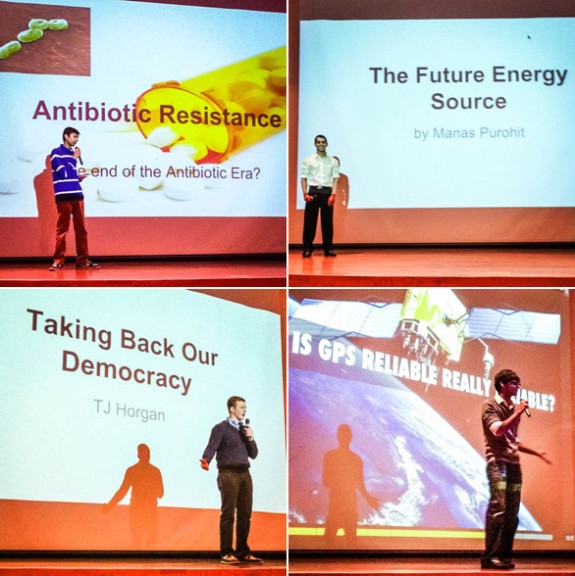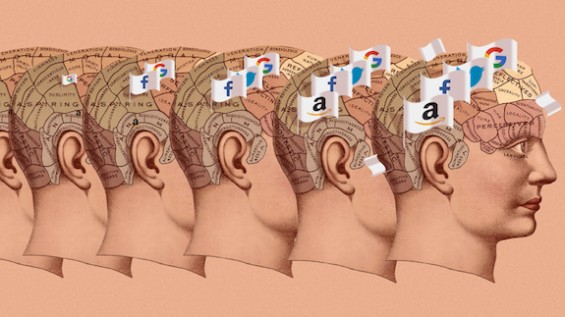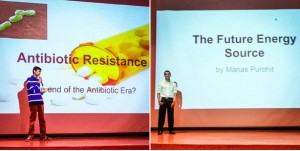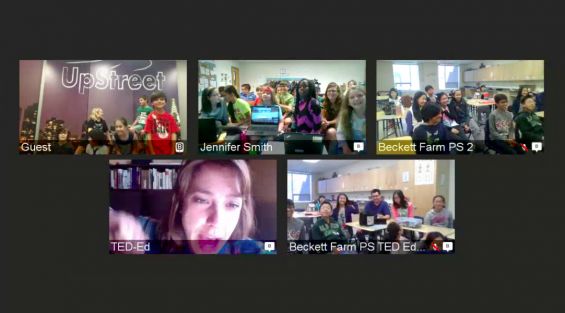
Antibiotics and particle physics: Burlington High School’s TED-Ed Club blinds us with science
“Using a powerful particle gun, we would shoot small pieces of matter through the force field and into the antimatter to make small, controlled bursts of energy…which we could then harness and put into batteries.” This quote reads like dialogue from a science fiction movie set in the distant future. It’s not. The (exponentially more exciting) truth is that it’s actually just a snippet pulled from a pilot TED-Ed Club presentation given by Burlington High School junior, Manas Purohit.
TED-Ed Clubs teach students how to give TED-style talks on an idea that truly matters to them. The scope and depth of the topics explored by TED-Ed Club Members during the pilot program was impressive, and some topics were downright mind-boggling. The students at Burlington High School’s topics included the reclamation of democracy, the future of autonomous vehicles, antibiotic resistance and, as mentioned…particle physics!
Manas Purohit, one member of this five-person club, was first drawn to the idea of using matter-antimatter-collisions as an alternative energy source after learning about the process via MIT’s Splash program in November. He was already spending free time researching cosmology and particle physics, so he decided to channel his research into an informational presentation of his own. When asked about challenges he faced in the process of creating his TED-ED Club presentation — essentially, his TED Talk — he said, “I think the most challenging part was actually getting up there and presenting. Talking to a person one-on-one, I can articulate my ideas well, but in front of a large crowd or in front of a camera, it’s more difficult.”
[Huh. We thought the particle physics would have been the hard part. Watch Purohit's presentation.]Purohit’s classmate, Ansh Bhammar, also went the science route. A junior at BHS, Ansh has been interested in medicine for as long as he can remember. His TED-Ed Club experience allowed him to delve deeper into the topic. For his final presentation he narrowed his focus to antibiotic resistance, or how certain bacteria survive even after being exposed to antibiotics. He even came up with an easy-to-remember, four-step action plan that laymen can follow to prevent further resistance.
[Want to know what those letters in his acronym stand for? Check out Bhammar's presentation.]For Bhammar, the best part of the experience was being able to share his interest with others. “You should have passion for something. Find something you’re interested in,” says Ansh. “Have a passion, because this is a rare opportunity to tell people what you think, especially when you’re 16 or 17 years old.”
Purohit, Bhammar, and their fellow Burlington High School TED-Ed Club members have certainly been exploring some big ideas. Want to start your own TED-Ed Club and get those ideas firing at your school? Fill out our application form here »





Ansh your documentary was really knowledgeable and more importantly helpful. As, you know what, I just used skip dosages of antibiotics frequently ( as I believed that medicines are just rubbish, I will develop my antibodies to fight against bacterias) and then blaming doctors for not curing my diseases. Rather now I just came to know that I was the only person responsible for making my bacterias resistant.
So I just wanna thank you for opening my eyes.